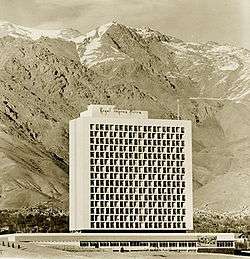Parsian Esteghlal International Hotel
| Parsian Esteghlal International Hotel | |
|---|---|
|
The Royal Tehran Hilton in 1967 | |
| Hotel chain | Parsian Hotels |
| General information | |
| Location | Tehran, Iran |
| Coordinates | 35°47′26″N 51°24′47″E / 35.7906°N 51.4130°ECoordinates: 35°47′26″N 51°24′47″E / 35.7906°N 51.4130°E |
| Opening | 1962 |
| Management | Parsian International Hotels Co. |
| Technical details | |
| Floor area | 70,000 m2 |
| Design and construction | |
| Architect | Heydar Ghiai |
| Other information | |
| Number of rooms | 550 |
| Number of restaurants | 6 |
| Website | |
| http://www.esteghlalhotel.ir/index.aspx?siteid=3&pageid=1148 | |

The Parsian Esteghlal International Hotel is a hotel in Tehran, Iran. Opened in 1962 as the Royal Tehran Hilton, the hotel was designed by local Iranian architect Heydar Ghiai. The hotel's design consultants also included noted British architect Raglan Squire,[1] who also designed Hilton hotels in Tunis, Bahrain, Nicosia and Jakarta.[2]
The hotel originally consisted of a single tower containing 259 rooms. An additional tower, with 291 more rooms, was constructed in 1972. The hotel's famous guests during this period included Ethiopian Emperor Haile Selassie, King Hussein of Jordan, and astronauts Neil Armstrong, Buzz Aldrin and Michael Collins.
The hotel was renamed the Esteghlal Hotel (meaning "Independence" Hotel in Persian) following the Islamic Revolution in 1979, when all foreign hotel management contracts were severed. It is today part of the state-run Parsian International Hotels Co. A third tower is currently under construction.
Building and Construction Facts
Unlike its more contemporary twin building, the original white concrete of the first tower was able to retain its coloration due to an innovation by its architect Heydar Ghiai who decided to include particles of crushed white marble into the concrete mix.
Architect's References
- J.I Cohen, M. Eleb & A. Martinelli, "The 20th century Architecture & Urbanism" ; Paris, A+U, 1990, pp. 146–51
- F. Ghiai, " Yady az Heydar Ghiai", Rahavard, No.26, No27, No28, No29, Los Angeles, 1990-91-92-93, pp. 246–52, pp. 233–40
- M. Ghiai, Iran Senate House, Max Gerard Edt. Draeger Paris, 1976 ISBN 2-85119-008-3
- Architecture d'aujourd'hui, No.78, 1958, "Exposition et Hotel à Teheran", pp. 96–101
- F. Bemont, "Teheran Contemporain", Art&Architecture, Teheran, No.17, 1973, pp. 85–88
- B. Oudin, Dictionnaire des Architectes, Paris, 1982, p. 187 ISBN 2-221-01090-6
- H. Stierlin, Iran des Batisseurs, "2500 ans d'Architecture", Geneva, 1971, p. 102
- Michel Ragon Histoire de l'architecture et de l'urbanisme modernes, éd.Casterman, Paris, 1986 ISBN 2-02-013290-7
- E. Yarshater, Encyclopædia Iranica, Volume X, New-York, 2001, p. 591-92
- M. Akri, "Iran during the Pahlavi Era, Major political players", London, 1989, p. 392
- R. Ghirshman, Persia El reino immortal, London, 1971, p. 141
- Paris Match, "La Grandeur d'un Regne; le Senat Iranien", No.1448, Paris, 1977, p. 12
- Teheran Journal, "Downtown's Masterpiece", March 5, 1977, p. 6
- Architecture Méditerranéenne, No 55, "From father to son, a dynasty of builders", Marseille, 2001, pp. 130–60
- Jours de France, "Monde", June 21, 1965, p. 65
- Jean Royere "Decorateur a paris" page 40 p165 edition Norma
- "GĪĀʾĪ, ḤAYDAR – Encyclopaedia Iranica". iranicaonline.org. Retrieved 2015-04-21.
Building Consultants References
- ↑ Golzari, P.N.; Fraser, P.M. (2014). Architecture and Globalisation in the Persian Gulf Region. Ashgate Publishing Limited. ISBN 9781409470984. Retrieved 2015-04-21.
- ↑ "Raglan Squire - Telegraph". telegraph.co.uk. Retrieved 2015-04-21.
